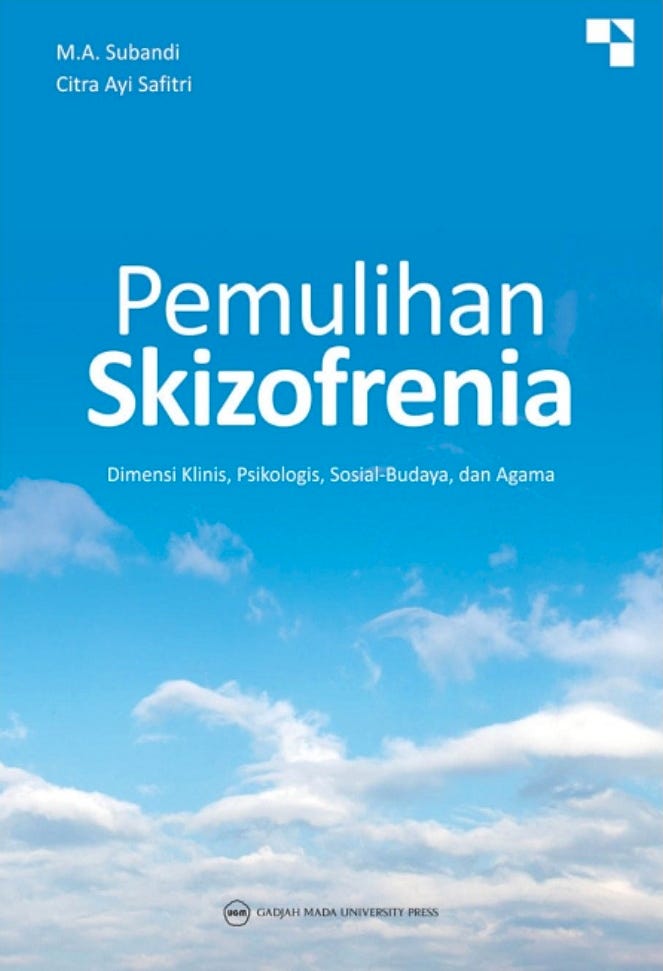Translating dignity: Indonesia’s leadership in recovery-based mental health reform
Pro bono translation of Subandi and Safitri’s groundbreaking work brings global attention to the abolition of pasung and survivor-centered, personalized care
Reading time: 4 minutes
Summary: Indonesia’s national mandate and ongoing work to eradicate pasung, the inhumane confinement and restraint of people with psychosocial disabilities, has become a global benchmark in rights-based psychiatric reform. I am honored to be translating the book Pemulihan Skizofrenia, meaning Recovery from Schizophrenia, coauthored by Professor Subandi and Citra Ayi Safitri, into English pro bono. The book, with a foreword by Professor Byron Good, Harvard Medical School, articulates a multidimensional recovery model grounded in clinical practice, survivor experience, and cultural-religious values. This translation aims to amplify Indonesia’s leadership as a model for ethical, inclusive, and non-coercive mental health care worldwide.
I am honoured to share that I have begun the pro bono translation of Pemulihan Skizofrenia: Dimensi Klinis, Psikologis, Sosial-Budaya dan Agama, translated by myself as Schizophrenia Recovery: Clinical, Psychological, Socio-Cultural, and Religious Dimensions, authored by Professor Subandi and Citra Ayi Safitri and published by UGM Press in 2024. This extraordinary volume, with potentially a new foreword by Professor Byron Good of Harvard Medical School, colleague of the authors and also a revered scholar committed to ending all abuses, presents Indonesia’s paradigm-shifting contributions to global mental health through a comprehensive, recovery-oriented framework rooted in both professional expertise and the lived experience of survivors. The translation will make accessible to international audiences one of the most exemplary national responses to psychiatric abuse and institutional neglect, offering a grounded model for transforming mental health care with dignity, ethics, and cultural depth. I am actively looking for publishers, and preparing the promotion.
This translation is part of a broader commitment to supporting knowledge equity and the circulation of exemplary, ethically grounded practices across linguistic and geopolitical boundaries. Indonesia’s experience, as articulated through this work, is not simply relevant, it is indispensable for all who seek to end psychiatric abuse and build care systems that foster hope, autonomy, and meaningful recovery.
Professor Subandi, an esteemed clinical psychologist and faculty member at Universitas Gadjah Mada (UGM), stands as one of Indonesia’s foremost scholars in the interdisciplinary field of mental health recovery, transcultural psychiatry, and community-based rehabilitation. His contributions are deeply rooted in both rigorous empirical research and culturally grounded clinical practice. His work has been instrumental in articulating and advancing the national mandate to abolish pasung, a practice of physical restraint and prolonged confinement of individuals with psychosocial disabilities, often within their own families or rural communities.
The abolition of such abuses, mandated by the Indonesian Ministry of Health, represents a globally significant case of structural, legal, and clinical transformation in mental health governance. Unlike tokenistic or biomedical-only reforms, the Indonesian model, championed by Subandi and his colleagues, integrates native knowledge systems, religious frameworks, family dynamics, and the lived experiences of survivors into a genuine pathway toward recovery and dignity. This initiative has drawn the attention and endorsement of global scholars, most notably Professor Byron Good of Harvard Medical School, whose decades-long collaboration with Indonesian experts underlines the transnational significance of this process.
Professor Citra Ayi Safitri is a clinical psychologist, researcher, and lecturer affiliated with Universitas Gadjah Mada (UGM), specializing in mental health recovery, psychosocial intervention, and culturally responsive care. Her work bridges academic research and community-based practice, with a strong focus on survivor narratives, family engagement, and the ethical integration of religion and culture in mental health services. As coauthor of Pemulihan Skizofrenia, she contributes a nuanced perspective on psychological functioning, empowerment, and the lived experience of healing, reinforcing Indonesia’s leadership in humane, rights-based reform.
The book Pemulihan Skizofrenia: Dimensi Klinis, Psikologis, Sosial-Budaya dan Agama, authored by Subandi and Citra Ayi Safitri and published by UGM Press in 2024, encapsulates this multidimensional recovery paradigm. I am currently working on the translation of this book into English, with the support and blessing of the authors. I am more than honored to learn and master Bahasa Indonesia, and contribute to share their impressive work and national example in this way. The volume bridges professional and experiential knowledge by centering two primary epistemic standpoints: the medical-clinical view from trained professionals, and the deeply personal narrative of survivors (penyintas jiwa), a term the authors propose in contrast to the institutionalized classification of ODGJ (Orang Dengan Gangguan Jiwa). This discursive shift itself reflects a profound ethical and ontological reframing: it no longer defines individuals solely by pathology or hospitalization status but affirms agency, autonomy, and subjectivity even amid ongoing symptoms.
The clinical dimension addresses symptom reduction and stabilization. The psychological axis foregrounds hope, autonomy, empowerment, meaning-making, and the uniqueness of each recovery process. Social-cultural recovery is understood through the prism of family roles, religious practice, and communal shame, the latter recoded as an emergent form of social reintegration rather than a mark of failure. Finally, the religious dimension, a cornerstone in many Indonesian communities, is not treated as an ancillary variable but as an integral force in healing, providing not only ritual scaffolding but existential coherence and moral legitimacy to the recovery journey. The work of Subandi and Safitri thereby stands as a canonical reference for transcultural, ethically attuned, and socially transformative psychiatric care, an achievement whose implications resonate far beyond Indonesia.



